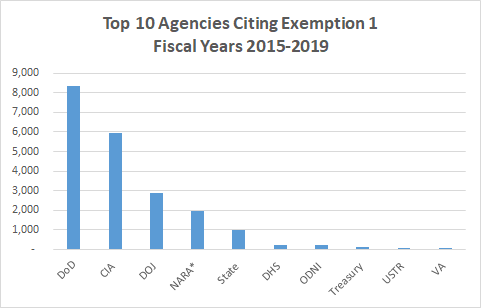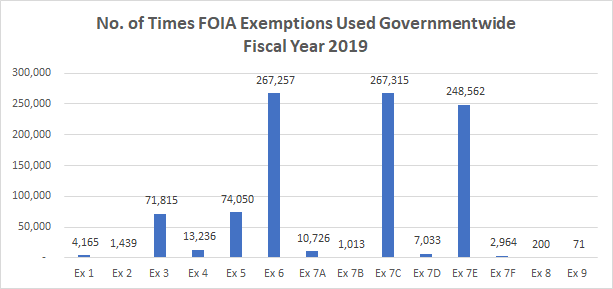
The Freedom of Information Act (FOIA) & Classified Records at a Glance
Exemption 1 of FOIA exempts from release records that are “(A) specifically authorized under criteria established by an Executive order to be kept secret in the interest of national defense or foreign policy and (B) are in fact properly classified pursuant to such Executive order,” 5 U.S.C. § 552(b)(1), effective July 4, 1967. Records are generally deemed classified when their release may harm national security.
Executive Order (E.O.) 13526 governs classified national security information by “prescrib[ing] a uniform system for classifying, safeguarding, and declassifying national security information, including information relating to defense against transnational terrorism,” E.O. 13526, signed December 29, 2009.
Agencies prefer that requesters seeking access to classified records file a FOIA request or a Mandatory Declassification Review (MDR) request. The differences are broadly outlined below.
|
FOIA |
MDR |
|---|---|
|
Authorization: 5 U.S.C. § 552; agency FOIA regulations |
Authorization: Executive Order 13526 and 32 C.F.R. 2001; ISCAP regulation 32 C.F.R. 2003 |
|
Records sought: specific records or records related to a general topic |
Records sought: specific or narrow range of identifiable records that the agency can locate with minimal effort. Records must be classified. |
|
Agencies: 20 working days to respond + in cases of unusual circumstances, an additional 10 working days |
Agencies: 1 year to respond |
|
Appeal: to agency FOIA appellate authority within 90 calendar days of agency response or after 20 working days as a constructive denial if agency has not acted on request |
Appeal: to agency within 60 calendar days of agency response or within 60 calendar days after 1 year as a constructive denial if agency has not acted on request. See 32 C.F.R. 2003 for additional specific information |
|
Still disagree: File a lawsuit in federal court or request OGIS assistance as a non-exclusive alternative to litigation
|
Still disagree: appeal to the Interagency Security Classification Appeals Panel (ISCAP), the final appellate authority made up of senior officials from specific agencies, established by E.O. 13526 |
|
|
Requester disagrees with ISCAP: no further recourse Agency disagrees with ISCAP: appeal to President within 60 calendar days |
Who’s Who at the National Archives and Records Administration (NARA)
Information Security Oversight Office (ISOO): responsible to the President for policy and oversight of the governmentwide security classification system and the National Industrial Security Program. Receives policy and program guidance from the National Security Council. ISOO’s Director is Executive Secretary of the Interagency Security Classification Appeals Panel (ISCAP) and ISOO staff provide support. Established in 1978, ISOO became part of NARA on November 17, 1995.
Interagency Security Classification Appeals Panel (ISCAP): senior-level representatives appointed by the Departments of Defense, Justice and State; NARA; the Office of the Director of National Intelligence; the National Security Advisor; and the Central Intelligence Agency (only in specific cases that involve CIA information) to review MDR appeals, classification challenges, and exemptions from automatic declassification. President appoints chair. Created by E.O. 12958, April 17, 1995. Administered by ISOO.
National Declassification Center (NDC): administers FOIA and MDR requests for NARA’s classified accessioned (historical) holdings. Streamlines declassification processes; facilitates quality assurance measures; and implements standardized training regarding declassification of records determined to have historical permanent value. NDC’s motto is “Releasing What We Can, Protecting What We Must.” Established on December 30, 2009, by Archivist David S. Ferriero in accordance with E.O. 13526.
Public Interest Declassification Board (PIDB): although not part of NARA, the ISOO Director is Executive Director of PIDB, which is also staffed by ISOO. Nine members, five appointed by the President, and one each by the Speaker and Minority Leader of the U.S. House, and the Majority and Minority Leaders of the U.S. Senate. Advises and provides recommendations to the President and other executive branch officials on the systemic, coordinated, and comprehensive identification, collection, review for declassification regarding issues pertaining to national classification and declassification policy. Established by Congress in 2000, the PIDB first met in 2005.
Last Updated: December 15, 2020

